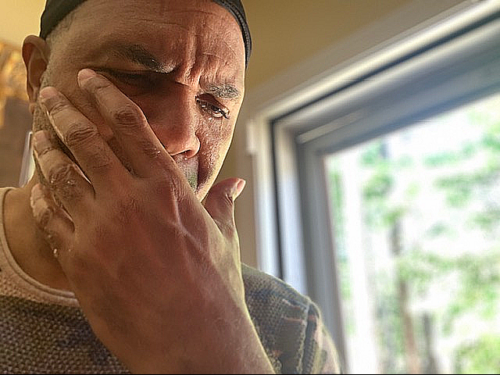It seems these days we all have a lot to cry about. Crying is a natural response to situations that make us happy, sad or frustrated. But are there any health benefits when we turn on the waterworks?
Well, according to researchers, crying will keep you physically and emotionally healthy. Not allowing yourself to cry increases stress levels, and contributes to diseases aggravated by stress, such as high blood pressure, heart problems, and peptic ulcers. In addition to the physical benefits, research shows that 85 percent of women and 73 percent of men feel less sad and angry after shedding some tears.
Crying is done more often than you think, and both sexes shed tears more often than you think. In the United States, women cry an average of 3.5 times per month, while men boo hoo an average of 1.9 times a month. As folks age, however, there seem to be a lot more things to cry about like the loss of family/friends/partners, loneliness, cynicism about life, frustration about no longer being able to do for self, health issues.
Crying can produce many health benefits and here are a few:
Aids sexually—Crymaxing, the act of crying during or after sex or orgasm is a form of release for some people. According to medical sexologist Dr. Marie Tudor, “with the ‘letting go’ that happens with orgasm, there can also be a letting go of emotions. For some people, that can involve crying.” If you’re crying because it all feels so good sexually, don’t worry about the tears, just let them flow.
Gets rid of toxins—Crying can cleanse the body of toxins and rid it of stress hormones. A study conducted by Dr. William H. Frey II, a biochemist and Professor of Pharmaceutics and faculty member in Neurology, Oral Biology and Neuroscience at the University of Minnesota, concluded that like other bodily processes, including exhaling, urinating, and sweating, toxic substances are also released from the body when we cry.
Battles bacteria– Tears contain the fluid lysozyme — also found in human milk, semen, mucus and saliva — that can kill 90 to 95 percent of all bacteria in just five to 10 minutes. A 2011 study published in the journal Food Microbiology found tears have such strong antimicrobial powers they can even protect against the contamination of the bacterium anthrax.
Relieves stress—Chronic stress can increase the risk of heart attack, damage certain areas of the brain, contribute to digestive issues like ulcers, and cause tension headaches and migraines, among other health issues. “Stress hormones are found in tears, and so crying literally releases pent-up emotional stress,” explains Sarah Thacker, a New York-based therapist and health coach.
Elevates mood—Many experts contend that crying works better at boosting dampened spirits than many antidepressant drugs according to a study from the University of South Florida. Researchers discovered that shedding tears releases feel-good hormones that pumped up the moods of nearly 90 percent of criers compared to the eight percent who reported that crying made them feel lousey. Individuals with anxiety or mood disorders were less likely to experience the uplifting effects of crying.
Stabilizes you–A Yale study found that crying can make you feel more stable. “People may be restoring emotional equilibrium with these expressions,” says Yale psychologist and the study’s lead researcher Dr. Oriana Aragón. “People who do this seem to recover better from strong emotions.”
Reduces manganese—The mineral manganese affects mood and is mostly found in tears. High levels of manganese is associated with anxiety, tremors, irritability, and aggression. When you cry, your manganese levels lessen.
Improves vision—The lubrication that is produced when crying can help improve eyesight. Dry eyes can result in blurry vision. Tears bathe the surface of the eye, says the National Eye Institute, keeping it moist, and wash away dust and debris. Crying can also prevents the dehydration of various mucous membranes.
Helps you bounce back after trauma– “Your emotions and your hormones are intrinsically connected,” explains Dr. Tina B. Tessina, a psychotherapist and author of It Ends With You: Grow Up and Out of Dysfunction. “Emotional reactions to events send hormones coursing through your body, and crying is your body’s and mind’s way to re-balance after a physical or emotional shock.”
Eases physical pain—When you hurt yourself physically like breaking a limb or getting burned, a natural reaction to these hurts might be to cry. Research has found that when you cry, the body releases feel-good hormones, like oxytocin, that increase pain tolerance and bring about a sense of calm—both of these can help to relieve pain in a major way.
Allow yourself to get it all out by letting the tears flow. Crying is a sign of strength and self-awareness, it flushes out all that needs to be released, so have a good go at it whenever you feel the need.











